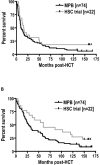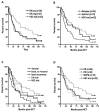Long-term outcome of patients with metastatic breast cancer treated with high-dose chemotherapy and transplantation of purified autologous hematopoietic stem cells
- PMID: 21767515
- PMCID: PMC4113088
- DOI: 10.1016/j.bbmt.2011.07.009
Long-term outcome of patients with metastatic breast cancer treated with high-dose chemotherapy and transplantation of purified autologous hematopoietic stem cells
Abstract
Metastatic breast cancer remains a major treatment challenge. The use of high-dose chemotherapy (HDCT) with rescue by autologous mobilized peripheral blood (MPB) is controversial, in part because of contamination of MPB by circulating tumor cells. CD34(+)Thy-1(+) selected hematopoietic stem cells (HSC) represent a graft source with a greater than 250,000-fold reduction in cancer cells. Here, we present the long-term outcome of a pilot study to determine feasibility and engraftment using HDCT and purified HSC in patients with metastatic breast cancer. Twenty-two patients who had been treated with standard chemotherapy were enrolled into a phase I/II trial between December 1996 and February 1998, and underwent HDCT followed by rescue with CD34(+)Thy-1(+) HSC isolated from autologous MPB. More than 12 years after the end of the study, 23% (5 of 22) of HSC recipients are alive, and 18% (4 of 22) are free of recurrence with normal hematopoietic function. Median progression-free survival (PFS) was 16 months, and median overall survival (OS) was 60 months. Retrospective comparison with 74 patients transplanted between February 1995 and June 1999 with the identical HDCT regimen but rescue with unmanipulated MPB indicated that 9% of patients are alive, and 7% are without disease. Median PFS was 10 months, and median OS was 28 months. In conclusion, cancer-depleted HSC following HDCT resulted in better than expected 12- to 14-year PFS and OS in a cohort of metastatic breast cancer patients. These data prompt us to look once again at purified HSC transplantation in a protocol powered to test for efficacy in advanced-stage breast cancer patients.
Copyright © 2012 American Society for Blood and Marrow Transplantation. Published by Elsevier Inc. All rights reserved.
Figures



Comment in
-
High-dose chemotherapy with autologous stem cell transplant for breast cancer: what have we learned 25 years later?Biol Blood Marrow Transplant. 2012 Jan;18(1):3-5. doi: 10.1016/j.bbmt.2011.10.045. Epub 2011 Dec 4. Biol Blood Marrow Transplant. 2012. PMID: 22146617 Free PMC article. No abstract available.
References
-
- Armitage JO. The History of Autologous Hematopoietic Cell Transplantation. In: Appelbaum FR, Forman SJ, Negrin RS, Blume KG, editors. Thomas' Hematopoietic Cell Transplantation: Stem Cell Transplantation. Fourth Wiley Blackwell; Oxford: 2009. pp. 8–14.
-
- Hryniuk W, Bush H. The importance of dose intensity in chemotherapy of metastatic breast cancer. J Clin Oncol. 1984;2:1281–1288. - PubMed
-
- Frei E, 3rd, Canellos GP. Dose: a critical factor in cancer chemotherapy. Am J Med. 1980;69:585–594. - PubMed
-
- Borgen E, Naume B, Nesland JM, et al. Standardization of the immunocytochemical detection of cancer cells in BM and blood: I. establishment of objective criteria for the evaluation of immunostained cells. Cytotherapy. 1999;1:377–388. - PubMed
-
- Ross AA, Cooper BW, Lazarus HM, et al. Detection and viability of tumor cells in peripheral blood stem cell collections from breast cancer patients using immunocytochemical and clonogenic assay techniques. Blood. 1993;82:2605–2610. - PubMed
MeSH terms
Grants and funding
LinkOut - more resources
Full Text Sources
Other Literature Sources
Medical
Miscellaneous

